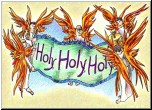THE SIBYLLINE ORACLES.

BOOK IV.
PEOPLE of boastful Asia and of Europe,
Hear how much, all too true, I am about,
Through a month many-toned, from my great hall
To prophesy; no oracle am I
Of lying Phbus whom vain men called god,
And further falsified by calling seer;
But of the mighty God, whom hands of men
Formed not like speechless idols carved of stone.
For he has not for his abode a stone
Most dumb and toothless to a temple drawn,
Of immortals a dishonor very sore;
For he may not be seen from earth nor measured
By mortal eyes, nor formed by mortal hand;
He, looking down at once on all, is seen
Himself by no one; his are murky night,
And day, and sun, and stars, and moon, and seas
With fish, and land, and rivers, and the mouth
Of springs perennial, creatures meant for life,
And rains at once producing fruit of field
And tree and vine and oil. This God a whip
Struck through my heart within to make me tell
Truly to men what things have now befallen
And how much shall befall them yet again
From the first generation to the eleventh;
For he himself by bringing them to pass
Will prove all things. But do thou in all things,
O people, to the Sibyl give all ear,
Who pours from hallowed mouth a truthful voice.
Blessed of men shall they be on the earth
As many as shall love the mighty God,
Offering him praise before they drink and eat;
Trusting in piety. When they behold
Temples and altars, figures of dumb stones,
[Stone images and statues made with hands]
Polluted with the blood of living things
And sacrifices of four-footed beasts,
They will reject them all; and they will look
To the great glory of one God and not
Commit presumptuous murder nor dispose
Of stolen gain, which things most horrid are;
Nor shameful longing for another's bed
Have they, nor vile and hateful lust of males.
Their manner, piety, and character
Shall other men, that love a shameless life,
Not ever imitate; but, mocking them
With jest and joke like babes in senselessness,
They'll falsely charge to them as many deeds
Blameful and wicked as they do themselves.
For slow is the whole race of human kind
To believe. But when judgment of the world
And mortals comes which God himself shall bring
Judging at once the impious and the pious,
Then indeed shall he send the ungodly back
To lower darkness [and then they shall know
How much impiety they wrought]; but the pious
Shall still remain upon the fruitful land,
God giving to them breath and life and grace.
But these things all in the tenth generation
Shall come to pass; and now what things shall be
From the first generation, those I'll tell.
First over all mortal shall Assyrians rule,
And for six generations hold the power
Of the world, from the time the God of heaven
Being wroth against the cities and all men
Sea with a bursting deluge covered earth.
Them shall the Medes o'erpower, but on the throne
For two generations only shall exult;
In which times those events shall come to pass:
Dark night shall come at the mid hour of day
And from the heaven the stars and circling moon
Shall disappear; and earth in tumult shaken
By a great earthquake shall throw many cities
And works of men headlong; and from the deep
They shall peer out the islands of the Sea.
But when the great Euphrates shall with blood
Be surging, then shall there be also set
Between the Medes and Persians dreadful strife
In battle; and the, Medes shall fall and fly
'Neath Persian spears beyond the mighty water
Of Tigris. And the Persian power shall be
Greatest in all the world, and they shall have
One generation of most prosperous rule.
And there shall be as many evil deeds
As men shall wish away--the din of war,
And murders, and disputes, and banishments,
And overthrow of towers and waste of cities,
When Hellas very glorious shall sail
Over broad Hellespont, and shall convey
To Phrygia sorrow and to Asia doom.
And unto Egypt, land of many furrows,
Shall sorry famine come, and barrenness
Shall during twenty circling years prevail,
What time the Nile, corn-nourisher, shall hide
His dark wave somewhere underneath the earth.
And there shall come from Asia a great king
Bearing a spear, with ships innumerable,
And he shall walk the wet paths of the deep,
And shall sail after he has cut the mount
Of lofty summit; him a fugitive
From battle fearful Asia shall receive.
And Sicily the wretched shall a stream
Of powerful fire set all aflame while Etna
Her flame disgorges; and in the deep chasm
Down shall the mighty city Croton fall.
And strife shall be in Hellas; they shall rage
Against each other, cast down many cities,
And fighting make an end of many men;
But equally balanced is the strife with both.
But, when the race of mortal men shall come
To the tenth generation, also then
Upon thc Persians shall a servile yoke
And terror be. But when the Macedonians
Shall boast the scepter there shall be for Thebes
An evil conquest from behind, and Carians
Shall dwell in Tyre, and Tyrians be destroyed.
And Babylon, great to see but small to fight,
Shall stand with walls that were in vain hopes built.
In Bactria Macedonians shall dwell;
But those from Susa and from Bactria
Shall all into the land of Hellas flee.
It shall take place among those yet to be,
When silver-eddying Pyramus his banks
O'erpouring, to the sacred isle shall come.
And Cibyra shall fall and Cyzicus,
When, earth being shaken by earthquakes, cities fall.
And sand shall hide all Samos under banks.
And Delos visible no more, but things
Of Delos shall all be invisible.
And to Rhodes shall come evil last, but greatest.
The Macedonian power shall not abide;
But from the west a great Italian war
Shall flourish, under which the world shall bear
A servile yoke and the Italians serve.
And thou, O wretched Corinth, thou shalt look
Sometime upon thy conquest. And thy tower,
O Carthage, shall press lowly on the ground.
Wretched Laodicea, thee sometime
Shall earthquake lay low, casting headlong down,
But thou, a city firmly set, again
Shalt stand. O Lycia Myra beautiful,
Thee never shall the agitated earth
Set fast; but falling headlong down on earth
Shalt thou, in manner like an alien, pray
To flee away into another land,
When sometime the dark water of the sea
With thunders and earthquakes shall stop the din
Of Patara for its impieties.
Also for thee, Armenia, there remains
A slavish fate; and there shall also come
To Solyma an evil blast of war
From Italy, and God's great temple spoil.
But when these, trusting folly, shall cast off
Their piety and murders consummate
Around the temple, then from Italy
A mighty king shall like a runaway slave
Flee over the Euphrates' stream unseen,
Unknown, who shall some time dare loathsome guilt
Of matricide, and many other things,
Having confidence in his most wicked hands.
And many for the throne will bloody
Rome's soil while he flees over Parthian land.
And out of Syria shall come Rome's foremost man,
Who having burned the temple of Solyma,
And having slaughtered many of the Jews,
Shall bring destruction on their great broad land.
And then too shall an earthquake overthrow
Both Salamis and Paphos, when dark water
Shall dash o'er Cyprus washed by many a wave.
But when from deep cleft of Italian land
Fire shall come flashing forth in the broad heaven,
And many cities burn and men destroy,
And much black ashes shall fill the great sky,
And small drops like red earth shall fall from heaven,
Then know the anger of the God of heaven,
For that they without reason shall destroy
The nation of the pious. And then strife
Awakened of war shall come to the West,
Shall also come the fugitive of Rome,
Bearing a great spear, having marched across
Euphrates with his many myriads.
O wretched Antioch, they shall call thee
No more a city when around their spears
Because of thine own follies thou shalt fall.
And then on Scyros shall a pestilence
And dreadful battle-din destruction bring.
Alas, alas! O wretched Cyprus, thee
Shall a broad wave of the sea cover, thee
Tossed on high by the whirling stormy winds.
And into Asia there shall come great wealth,
Which Rome herself once, plundering, put away
In her luxurious homes; and twice as much
And more shall she to Asia render back,
And then there shall be an excess of war.
And Carian cities by Mæander's waters,
Girded with towers and very beautiful,
Shall by a bitter famine be destroyed,
When the Mæander his dark water hides.
But when piety shall perish from mankind,
And faith and right be hidden in the world,
. . . Fickle . . . and in unhallowed boldness
Living shall practice wanton violence,
And reckless evil deeds, and of the pious
No one shall make account, but even them all
From thoughtlessness they utterly destroy
In childish folly, in their violence
Exulting and in blood holding their bands;
Then know thou that God is no longer mild,
But gnashing with fury and destroying all
The race of men by conflagration great.
Ah! miserable mortals, change these things,
Nor lead the mighty God to wrath extreme;
Put giving up your swords and pointed knives,
And homicides and wanton violence,
Wash your whole body in perennial streams,
And lifting up your hands to heaven seek pardon
For former deeds and expiate with praise
Bitter impiety; and God will give
Repentance; he will not destroy; and wrath
Will he again restrain, if in your hearts
Ye all will practice honored piety.
But if, ill-disposed, ye obey me not,
But with a fondness for strange lack of sense
Receive all these things with an evil ear,
There shall be over all the world a fire
And greatest omen with sword and with trump
At sunrise; the whole world shall hear the roar
And mighty sound. And he shall burn all earth,
And destroy the whole race of men, and all
The cities and the rivers and the sea;
All things he'll burn, and it shall be black dust.
But when now all things shall have been reduced
To dust and ashes, and God shall have calmed
The fire unspeakable which he lit up,
The bones and ashes of men God himself
Again will fashion, and he will again
Raise mortals up, even as they were before.
And then shall be the judgment, at which God
Himself as judge shall judge the world again;
And all who sinned with impious hearts, even them,
Shall he again hide under mounds of earth
[Dark Tartarus and Stygian Gehenna].
But all who shall be pious shall again
Live on the earth [and (shall inherit there)
The great immortal God's unwasting bliss,]
God giving spirit life and joy to them
[The pious; and they all shall see themselves
Beholding the sun's sweet and cheering light.
O happy on the earth shall be that man].
|


